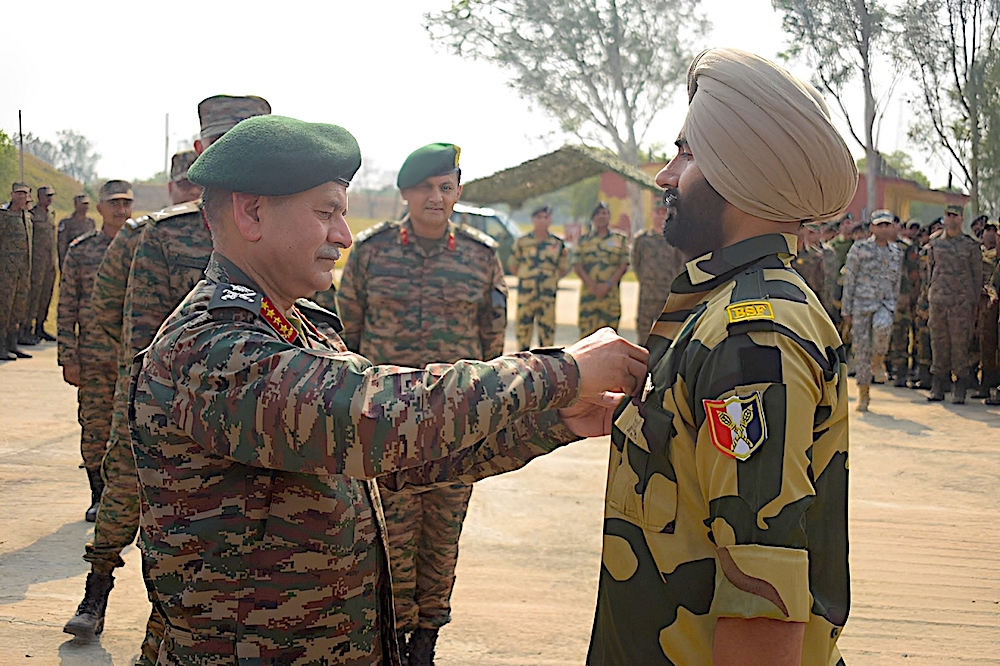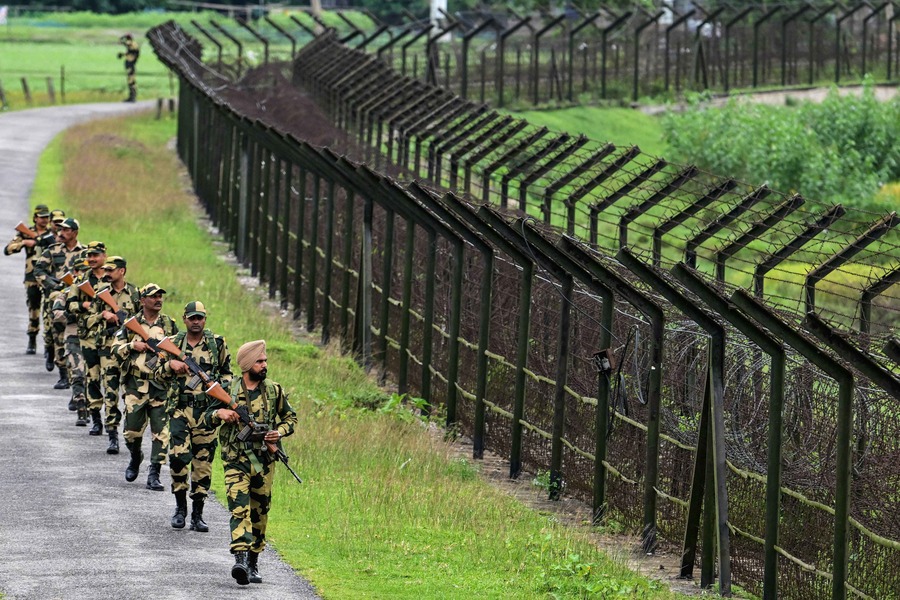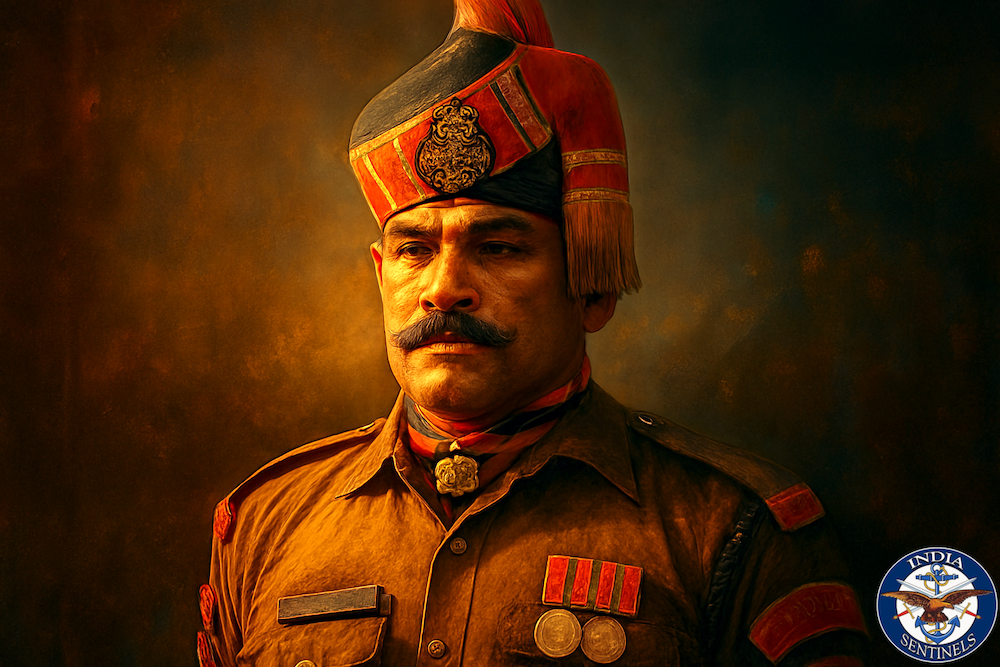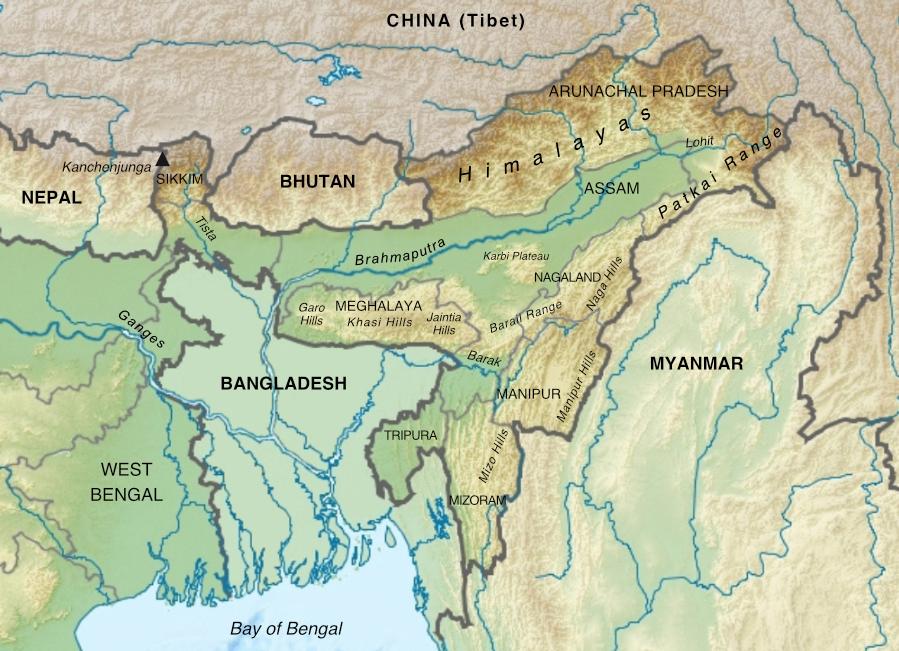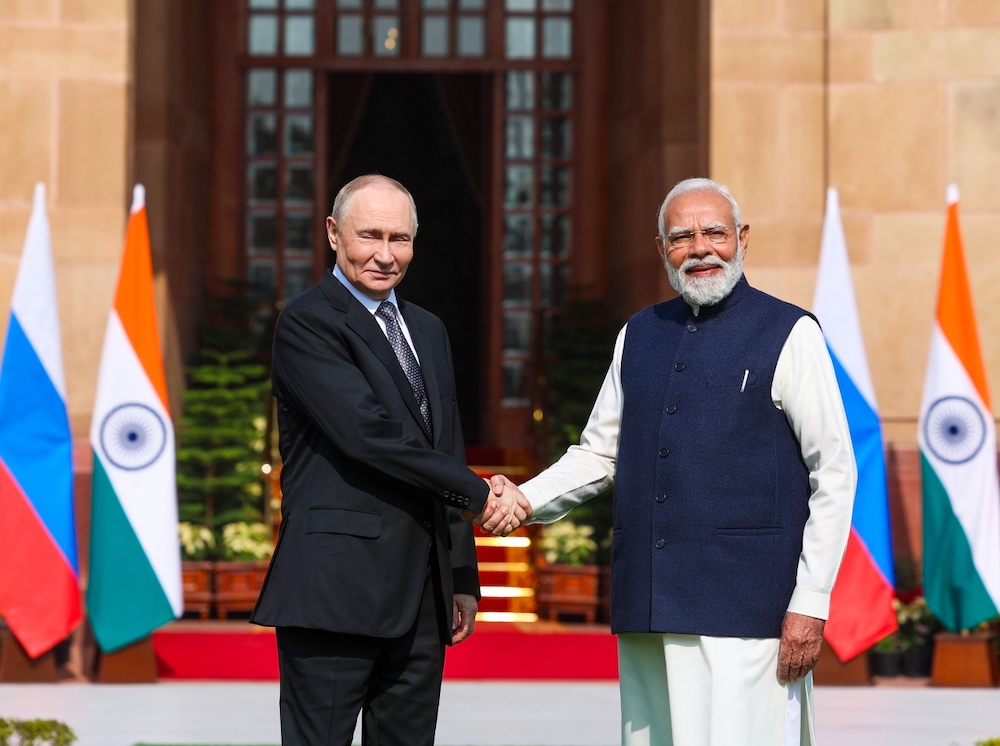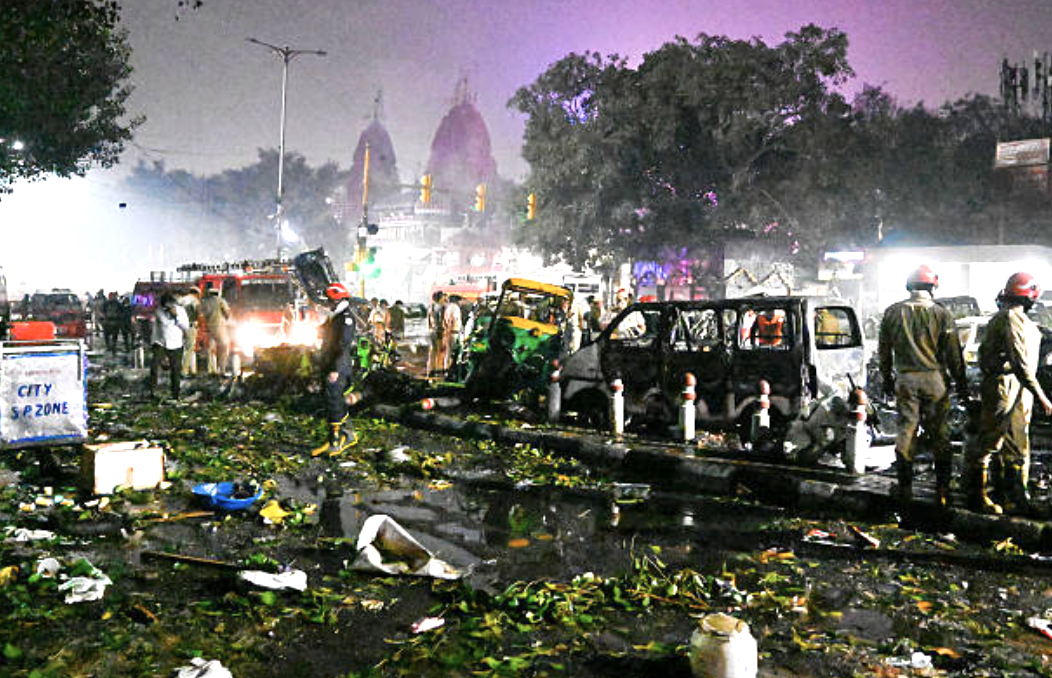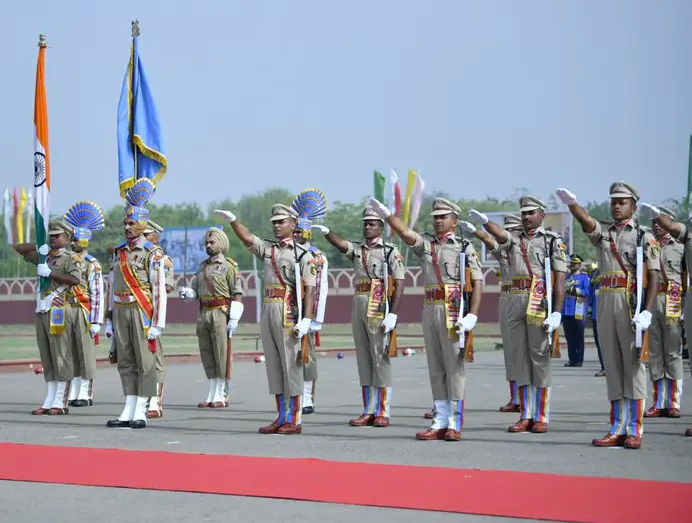 Border Security Force soldiers firing a mortar somewhere in the western front. (Photo: X/@BSF_Rajasthan)
Border Security Force soldiers firing a mortar somewhere in the western front. (Photo: X/@BSF_Rajasthan)
The Border Security Force (BSF), India’s first line of defence, shoulders the responsibility of guarding approximately 190 kilometres of international border in Jammu – from south of Chenab to Pathankot – encompassing the districts of Jammu, Samba, and Kathua. It was along this stretch that a pitched battle of offensive defence unfolded between the BSF and Pakistani regulars and rangers in the aftermath of India’s “Operation Sindoor”, in which India initially launched airstrikes against Pakistan- and Pakistan-occupied Kashmir-based terror hubs.
The confrontation showcased the professional heroism and extraordinary bravery of BSF personnel while highlighting the tactical acumen of BSF’s homegrown indigenous leadership in planning and executing operational methodologies.
These leaders successfully guided their men through the most adverse and hostile battle environments. Both the troops and their commanders emerged victorious, defeating Pakistan in every aspect of this battle – a conflict deliberately designed to be aggressive in planning and offensive in execution.
Read also: Pahalgam attack is a wake-up call to shed myopic view on J&K proxy war
Testimony of Strength and Leadership
Operation Sindoor stands as a true testament to the professional strength, heroics, and bravery of BSF personnel and their leadership provide by the force’s own officer cadre. The vision and strategic appreciation demonstrated by field commanders helped thwart Pakistan’s nefarious designs along the entire Jammu international border. BSF commandants, deputy inspector generals, and junior leadership effectively guided troops on the ground, establishing local superiority over Pakistani forces along the whole stretch.
The role of “COMMANDANT KA TOPKHANA” (Commandant’s Artillery) – the designated battalion’s artillery – was instrumental in establishing this local superiority and holding the day for both the force and the nation in the conflict zone.
The heroism displayed by BSF personnel and field commanders earned nationwide praise, reflected in the prime minister’s address to the nation where he specifically mentioned, “Our Border Security Force – BSF, [and] India’s [other] paramilitary forces are on constant alert,” alongside the armed forces. The BSF’s role also earned commendation from the director general of military operations (DGMO), Lieutenant General Rajiv Ghai.
Read also: Was Op Sindoor ceasefire premature? Analysing its strategic impact
The Operation Unfolds
Operation Sindoor commenced on the intervening night of May 6 and May 7, inflicting extensive damage on Pakistan’s terror infrastructure. On May 8, the Border Security Force conducted pre-emptive strikes on Pakistani border outposts (BOPs) and launch pads, killing numerous members of the country’s so-called “Border Action Teams” or BATs, which are a combination of their Army regulars, special forces, and highly trained militants, thereby foiling suspected BAT actions and infiltration attempts.
These actions were based on hard local intelligence. The BSF’s swift response resulted in the elimination of approximately seven militants and uniformed men, foiling a major action and damaging a Pakistani post. Jitendra Singh, Union minister and MP from Udhampur, posted on X that “Dhandar Post” had suffered extensive damage.
Had these pre-emptive strikes not been initiated, BAT groups or militants might have attempted local cross-border actions or infiltration, potentially affecting the morale of locals amid the battle fog. BSF personnel and commanders on the ground successfully prevented such outcomes, delivering a major blow to enemy morale – which was already low following successful strikes in Pakistan-occupied Kashmir and Punjab.
Read also: Robust HUMINT network is the key to defeat militancy in J&K
Aggressive Retaliation
The BSF didn’t limit its operations to the Samba sector. It also destroyed enemy launch pads and posts in Sialkot. This aggressive retaliatory action came in response to Pakistan’s unprovoked firing on BSF posts, which caused widespread damage to Pakistan Rangers’ posts and assets.
During these operations, a BSF sub-inspector, Mohammad Imtiyaz, and a constable, Deepak Chingkham, made the supreme sacrifice by getting killed in action. It’s worth noting that BSF field leadership, through shrewd and well-thought-out strategy, had anticipated that the border outposts – being in eyeball-to-eyeball contact and registered targets – would receive heavy artillery shelling aimed at immediate neutralization and damage to personnel and material.
The commanders had wisely dispersed their men in patterns designed to ensure minimal damage. During periods of intense shelling and bombing, personnel remained under cover to avoid casualties, as retaliatory action could only be taken after the shelling subsided. How these men came under shelling requires analysis and investigation to draw appropriate lessons for avoiding casualties in future conflicts.
Professional Preparation and Response
The BSF field leadership at battalion and sector levels professionally prepared their commands for all contingencies and trained them accordingly. They established high professional benchmarks for success in battle, which they subsequently achieved. This leadership – comprising company commanders, commandants, and deputy inspector generals – worked silently to prepare their commands for battle, ensuring aggressive response and retaliation that imposed heavy costs upon the enemy.
The BSF personnel rose to the occasion, displaying their weaponry and tactical skills to inflict heavy damage upon the enemy using “area weapons”. The field leadership was well-prepared, having planned for all contingencies during peacetime and trained their men accordingly. The personnel were mentally conditioned and physically rehearsed for all scenarios, ensuring effective response and high morale despite battle pressures.
Read also: High time government empowers BSF cadre officers lead the force at highest level
Tactical Excellence
Another unique feature of Operation Sindoor was the aggressive, swift, and accurate response of mortar platoons and detachments of support companies. They engaged targets with accuracy and precision, causing major damage to enemy morale.
The operation has opened a window of opportunity to analyse the present composition of the support companies and revisit it in light of modern battle realities. The support companies need strengthening, which requires extensive brainstorming and incorporation of lessons from the present conflict.
Preparedness Across Fronts
The Border Security Force was prepared to meet any eventuality, not only in the Jammu region but also along the entire western front comprising Punjab, Rajasthan, and Gujarat. Operation Sindoor reinforced the need for strong regimentation in the BSF, which has seen dilution over time. It demonstrated that personnel who live and train together as a family are better prepared to deal with difficult combat situations, as joint living fosters camaraderie – highlighting the need for strengthening regimentation.
Read also: The unrecognized contribution of BSF in Kargil war
Living Up to a Legacy
The BSF had earned its reputation through its aggressive and effective role in supporting the Army during the 1971 war. It was designated as the “first line of defence” by the-then prime minister, Indira Gandhi, for its effective role in defeating Pakistan shoulder to shoulder with the Indian Army.
Read also: Story of BSF’s key role, valour and sacrifices in 1971 India-Pakistan war
In Operation Sindoor, through well-planned and executed battle drills and procedures, the BSF lived up to its name as the first line of defence – not only in the Jammu region but along the entire western and eastern fronts. The BSF excelled through advance planning and meticulous execution.
There is now a need to revisit the entire operational scenario from May 7 to May 10, 2025, to draw appropriate lessons from this conflict and initiate professional and human resource development measures to continue living up to its designation as the “FIRST LINE OF DEFENCE.” The BSF leadership will undoubtedly rise to the occasion, taking measures to learn the right lessons and carry forward the high professional benchmarks set by field leadership in Operation Sindoor.
Disclaimer: The views expressed in the article are the author’s own and don’t necessarily reflect the views of India Sentinels.
Follow us on social media for quick updates, new photos, videos, and more.
X: https://x.com/indiasentinels
Facebook: https://facebook.com/indiasentinels
Instagram: https://instagram.com/indiasentinels
YouTube: https://youtube.com/indiasentinels
© India Sentinels 2025-26


